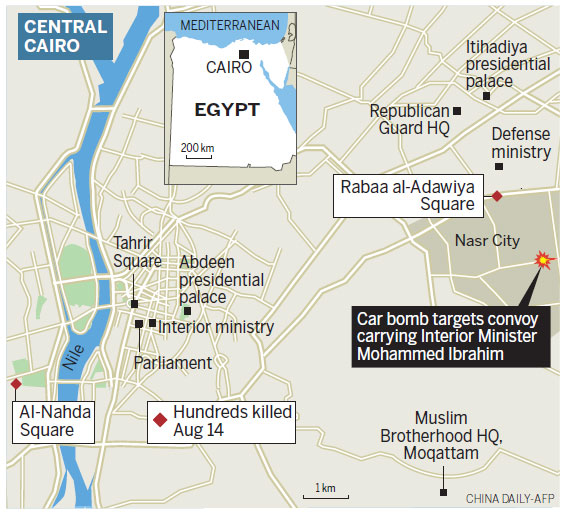Egypt's interior minister survives car bomb attack
Egypt's Interior Minister Mohammed Ibrahim narrowly escaped assassination on Thursday when a car bomb tore through his convoy, wounding 22 people and leaving a major Cairo boulevard strewn with debris - the first such attack since the military ousted the country's Islamist president.
The country's main Islamic groups on Thursday denied responsibility for the attempted assassination. No organizations so far have admitted responsibility for the attack. Several liberal movements accused the Muslim Brotherhood of involvement.
Condemning the incident, the Muslim Brotherhood - the most prominent Islamic group in Egypt backing ousted president Mohammed Morsi - described it as a "crime" in a statement.
The interim president compared the attack with the insurgency waged by militants in the 1980s and 1990s against the rule of former leader Hosni Mubarak, when militants carried out numerous assassination attempts, killing the Parliament speaker. Mubarak himself survived an assassination attempt in 1994 when militants attacked his convoy in Addis Ababa, Ethiopia.
Since Morsi's eviction from office on July 3, Egypt has been back under emergency law. Police have arrested nearly 2,000 members of his Muslim Brotherhood and other Islamist supporters.
In mid-August, authorities forcefully dispersed two pro-Morsi sit-in camps in Cairo after days of warnings, setting off violence that killed hundreds nationwide. The move led to retaliatory strikes on government buildings, police stations and churches around the country.
Nonetheless, Thursday's bombing against Ibrahim, who heads the police force waging the crackdown, was a substantial escalation.
Interim President Adly Mansour's office vowed it would "not allow the terrorism the Egyptian people crushed in the 1980s and 90s to raise its ugly head again".
The attack is likely to further isolate the Islamists. Liberal politician Amr Moussa called on the ousted president's backers to take a clear position against the bombing. "When lives of innocents are targeted, those who support that or justify it will not be accepted among us," Moussa said.
Morsi's supporters sought to distance themselves from the attack.
The Anti-Coup Coalition, a group of Islamist factions that has spearheaded protests since Morsi's ouster, predicted it would be used as a pretext for widening the crackdown on its opponents. "The coalition is against any violent act, even if it is against those who committed crimes against the people," the group said.
AP-Xinhua



















